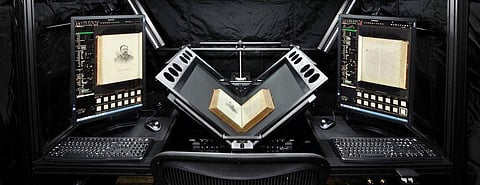

On the way to Vandalur, the dusty roads pretty much blind the windshields and the flyover constructions bring traffic to a standstill all the time. But in a corner, in all that dust and pollution stands the HTC Global Services Building. Inside the building, hundreds of pages from hundreds of years ago get digitised on a daily basis.
To be exact, a million pages get digitised every single week.
HTC Global Services has been working with various literary organisations across the world and digitising old and rare books, newspapers, maps, textbooks, academic journals, handwritten documents and even year books! Natraj Kumar, Vice President and Head of ITES, BPO, HTC Global Services spoke to us about how the process takes place and how the company is creating history by helping preserve such delicate and important documents.
Kumar said that HTC's clients include world renowned libraries, publishing companies, Universities, museums and other such organisations. They all reach out to HTC to digitise their documents. Through their software, HTC has managed to build a platform that can preserve even handwritten documents from years ago by maintained the clarity and letting it remain in access to people across the world.
They even enhance old data abstracts, journals, old math equations, chemistry equations and financial data and statistics too. The list covers medical journals, biochemistry books, law journals of advocates, paper records and even land documents. "We've digitised over eight million land documents from Oklohoma. We also digitise birth and death certificates," Kumar said. Some of the rarest books have gone through the scanner machines at HTC.
They digitise images as well, that now make it easily searchable on the internet. Another interesting bit of work that HTC does, besides digitising, is that it makes the document accessible to the user in the same way that any regular document created in the post-computer era. This essentially means that the references in the article are linked to the pages — so just clicking on a reference will take you back to the location of the page. HTC also does image stitching - meaning it can put together old, torn or worn out pictures, it can do curvature correction. It also does descreening which is an optional adjustment (or filter) that can be applied to an image while it is being scanned on a flatbed scanner.
HTC also works with article level metadata and handwritten content where it ensures 70 percent accuracy. They have also digitised the handwritten lyrics of The Beatles' Yesterday! But probably one of the most interesting work that HTC does is work on genealogy through Year Books! The HTC software helps facial recognition by digitising year books and helps connect two people.
From the National Library of Australia to the Royal Dutch Library and the US Library of Honolulu, various world renowned libraries are part of the clientele of HTC. Housed in complete air conditioned rooms with experts and the best safety conditions, the machines that translate hundreds of pages everyday are stored. "We have also managed to provide employment to all the people around the area here and they are all trained to handle the documents with care," he said.
Kumar elaborated that since their move to Vandalur, HTC has encouraged the local population to join their company and provide technical education as well. "Our employees also have the opportunity to grow steadily up the ladder," he said.
